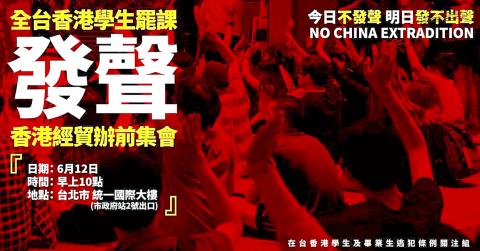New Power Party (NPP) legislators and a coalition of civic groups yesterday urged the government to cancel the special legal status granted to Hong Kong officials and investors with Chinese ties amid growing concerns over a Hong Kong extradition bill.
The bill, proposed by the Hong Kong Government to allow extradition to any jurisdiction including mainland China, is a Chinese Communist Party attempt to “Sinicize” the territory and use it as a gateway to infiltrate other nations, the NPP legislative caucus said in a joint statement.
If passed, anyone passing through Hong Kong could be sent to the mainland for trial and subject to China’s notoriously opaque judicial system, it said.

Photo courtesy of Ho Wing-tung
With the bill expected to pass a second reading at the Hong Kong Legislative Council today, the administration of President Tsai Ing-wen (蔡英文) should openly oppose the legislation, provide reports on its possible effects on Taiwan and propose the necessary responses, the statement said.
Specifically, the reports and proposed responses should consider the legislation’s effect on Taiwanese visiting Hong Kong, Taiwan’s relations with the territory and how it could be used to promote unification across the Taiwan Strait, it said.
The government should also consider adjusting the special status granted to Hong Kong, and extend cross-strait restrictions and review mechanisms related to Hong Kong officials and investors with strong ties to China, it said.
Furthermore, the government should work to refine guidelines on offering political asylum to protect people from Hong Kong and other parts of China fleeing political persecution, it said.
As the Hong Kong Government appears determined to railroad through the bill, Tsai should immediately hold a news conference to oppose the bill, NPP caucus whip Hsu Yung-ming (徐永明) wrote on Facebook.
“Do not let Hong Kong’s freedom get the death penalty,” he added.
The Taiwan Citizen Front, the Taiwan Association for Human Rights, the New School for Democracy, the Judicial Reform Foundation and other civic groups also issued a statement urging the government to plan its responses to the extradition law and adjust Hong Kong’s special legal status.
Hong Kong has been given special treatment in terms of lower tariffs, less investment restrictions and other privileges based on the supposition that it is different from China, being a relatively autonomous region that adheres to the rule of law, Taiwan Citizen Front founder Lai Chung-chiang (賴中強) said.
However, if the bill passes, it would call into question that supposition, requiring the government to rethink whether to continue applying the special treatment, he said.
“Taiwan and other nations should express to China that if it deprives Hong Kong of its autonomy, there would be no reason for us to treat the territory differently than other parts of China,” he said.
Separately, Hong Kong students in Taiwan have announced plans to walk out of classes today and rally outside the Hong Kong Economic, Trade and Cultural Office in Taipei in support of strikes in Hong Kong to oppose the extradition bill.
Organizers of the walkout said that they expect more than 300 students to join the rally.
According to the Ministry of Education, there are 7,691 Hong Kongers studying in Taiwan, 1,617 of them first-year students at universities and colleges.
Additional reporting by Wu Po-hsuan

Taiwan is stepping up plans to create self-sufficient supply chains for combat drones and increase foreign orders from the US to counter China’s numerical superiority, a defense official said on Saturday. Commenting on condition of anonymity, the official said the nation’s armed forces are in agreement with US Admiral Samuel Paparo’s assessment that Taiwan’s military must be prepared to turn the nation’s waters into a “hellscape” for the Chinese People’s Liberation Army (PLA). Paparo, the commander of the US Indo-Pacific Command, reiterated the concept during a Congressional hearing in Washington on Wednesday. He first coined the term in a security conference last

Prosecutors today declined to say who was questioned regarding alleged forgery on petitions to recall Democratic Progressive Party (DPP) legislators, after Chinese-language media earlier reported that members of the Chinese Nationalist Party (KMT) Youth League were brought in for questioning. The Ministry of Justice Investigation Bureau confirmed that two people had been questioned, but did not disclose any further information about the ongoing investigation. KMT Youth League members Lee Hsiao-liang (李孝亮) and Liu Szu-yin (劉思吟) — who are leading the effort to recall DPP caucus chief executive Rosalia Wu (吳思瑤) and Legislator Wu Pei-yi (吳沛憶) — both posted on Facebook saying: “I

The Ministry of Economic Affairs has fined Taobao NT$1.2 million (US$36,912) for advertisements that exceed its approved business scope, requiring the Chinese e-commerce platform to make corrections in the first half of this year or its license may be revoked. Lawmakers have called for stricter enforcement of Chinese e-commerce platforms and measures to prevent China from laundering its goods through Taiwan in response to US President Donald Trump’s heavy tariffs on China. The Legislative Yuan’s Finance Committee met today to discuss policies to prevent China from dumping goods in Taiwan, inviting government agencies to report. Democratic Progressive Party Legislator Kuo Kuo-wen (郭國文) said

The Ministry of Economic Affairs has fined Taobao NT$1.2 million (US$36,900) for advertisements that exceeded its approved business scope and ordered the Chinese e-commerce platform to make corrections in the first half of this year or its license would be revoked. Lawmakers have called for stricter supervision of Chinese e-commerce platforms and more stringent measures to prevent China from laundering its goods through Taiwan as US President Donald Trump’s administration cracks down on origin laundering. The legislature’s Finance Committee yesterday met to discuss policies to prevent China from dumping goods in Taiwan, inviting government agencies to report on the matter. Democratic Progressive Party